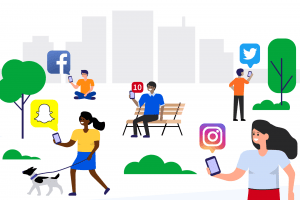The book It’s complicated captured my attention right from the preface, only because of a simple sentence: “This book is just that: my attempt to describe and explain the networked lives of teens to the people who worry about them—parents, teachers, policy makers, journalists, sometimes even other teens.” (Boyd p. x). I feel like this topic is nowadays pretty underestimated and people do not pay it enough attention. Most of the latest contributions about social networking are warnings and they tell us, that nowadays kids and teens are not only addicted, but also, that it’s endangering their (our) evolution, eventually adulting. This is why I like the core idea of this book, that the author is not judgmental, but tries to understand this problem and tries to seek the profundity and origins of this phenomenon.
But from the beginning I kept asking myself. In which category would I put myself? Where do I belong? Am I a phone-addicted kid, or a judgmental adult? I see myself balancing and oscillating between these two extremes, however, I cannot be assigned to one, nor the other. Which confuses me a little bit. I still have not figured it out.
The next question, popping in my head while reading, was: Isn’t the only problem parents’ jealousy? Just because these devices were not available in their youth, does it automatically mean it’s wrong? In one example the author pointedly remarks that teens, unlike their parents, look at their phones only when they are sharing the screen with the person sitting next to them or are reading or viewing something together. (Boyd). They would have done the same if they had the opportunity.
In this world, during the last (and consequent) decades, it is (and it will be) almost unmanageable to function without any device, nor social network. It is possible, but it definitely is not easy. Like the author claims, the teens only “want to be a part of the broader world by connecting with other people and having the freedom of mobility” (Boyd p. 10), and “they don’t try to analyse how things are different because of technology; they simply try to relate to a public world in which technology is a given.” (Boyd p. 13).
All in all, my message is to try not to judge the young generation for spending time on their phones, having apps like Instagram or TikTok, chatting with friends. Especially (but not only) within these corona days, it may be the only way for them, to stay connected with the world.
